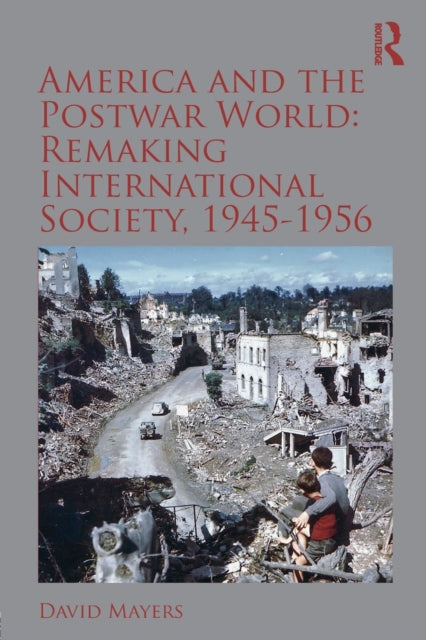DavidMayers
America and the Postwar World: Remaking International Society, 1945-1956
America and the Postwar World: Remaking International Society, 1945-1956
YOU SAVE £2.07
- Condition: Brand new
- UK Delivery times: Usually arrives within 2 - 3 working days
- UK Shipping: Fee starts at £2.39. Subject to product weight & dimension
Bulk ordering. Want 15 or more copies? Get a personalised quote and bigger discounts. Learn more about bulk orders.
Couldn't load pickup availability
- More about America and the Postwar World: Remaking International Society, 1945-1956
The main tide of international relations scholarship on the first years after World War II emphasizes the Cold War and the creation of an economic order (Bretton Woods). This scholarship is rife with contending schools of interpretation and is bolstered by declassified archival documents. This book examines a past that ran concurrent with the Cold War and interacted with it, focusing on Washington's attempt to redesign international society. The U.S.-led attempt during the first postwar years to salvage international society focused on the United Nations Relief and Rehabilitation Administration, the Acheson-Lilienthal plan to contain the atomic arms race, the Nuremberg and Tokyo tribunals to force Axis leaders to account, the 1948 Genocide Convention, the 1948 Universal Declaration of Human Rights, and the founding of the United Nations.
\n Format: Paperback / softback
\n Length: 282 pages
\n Publication date: 19 March 2018
\n Publisher: Taylor & Francis Inc
\n
The dominant narrative in international relations scholarship during the years immediately following World War II has been centered on the Cold War, highlighting the geopolitical rivalry between the United States and the Soviet Union. This scholarship has paid considerable attention to the security state and the establishment of an economic order, primarily designed by Americans and tailored to their interests, despite resistance from populations outside of North America, Western Europe, and Japan. This scholarship, which views the Cold War as a central phenomenon and a reconfigured global economy, is characterized by diverse interpretations and is supported by extensive access to declassified archival documents.
In contrast, this book explores a historical period that overlapped with the Cold War but can also be viewed as distinct. It focuses on Washington's actions in the first years after World War II, in response to the devastating consequences of the war. The international society that emerged during this time was characterized by its amorphous nature, but it also possessed a tangible aspect, as self-regarding states occasionally cooperated through treaties, laws, norms, diplomatic customs, and transnational institutions.
The United States-led effort to salvage international society during the postwar years centered on various initiatives. These included the United Nations Relief and Rehabilitation Administration, aimed at providing aid and rehabilitation to war-affected regions; the Acheson-Lilienthal plan, designed to contain the atomic arms race; the Nuremberg and Tokyo tribunals, which held Axis leaders accountable for war crimes; the 1948 Genocide Convention, which sought to prevent and punish genocide; the 1948 Universal Declaration of Human Rights, which affirmed the fundamental rights and freedoms of individuals; and the founding of the United Nations, an international organization aimed at promoting peace, security, and cooperation among nations.
While these initiatives individually and collectively did not have a transformative effect, they did contribute to ameliorating the circumstances of the postwar period. They established important legal frameworks, promoted human rights, and sought to prevent the recurrence of genocidal atrocities. The United Nations, in particular, has played a crucial role in shaping the international system and fostering cooperation among nations since its establishment.
In conclusion, while the dominant narrative in international relations scholarship has focused on the Cold War, this book offers a different perspective by examining Washington's actions in the first years after World War II. It highlights the efforts made by the United States to salvage international society and the various initiatives that were undertaken to promote peace, security, and cooperation among nations. These initiatives, although not transformative in themselves, did contribute to a better understanding of the complex dynamics of the postwar period and the ongoing challenges of international relations.
\n Weight: 466g\n
Dimension: 155 x 233 x 17 (mm)\n
ISBN-13: 9780815376163\n \n
This item can be found in:
UK and International shipping information
UK and International shipping information
UK Delivery and returns information:
- Delivery within 2 - 3 days when ordering in the UK.
- Shipping fee for UK customers from £2.39. Fully tracked shipping service available.
- Returns policy: Return within 30 days of receipt for full refund.
International deliveries:
Shulph Ink now ships to Australia, Belgium, Canada, France, Germany, Ireland, Italy, India, Luxembourg Saudi Arabia, Singapore, Spain, Netherlands, New Zealand, United Arab Emirates, United States of America.
- Delivery times: within 5 - 10 days for international orders.
- Shipping fee: charges vary for overseas orders. Only tracked services are available for most international orders. Some countries have untracked shipping options.
- Customs charges: If ordering to addresses outside the United Kingdom, you may or may not incur additional customs and duties fees during local delivery.


